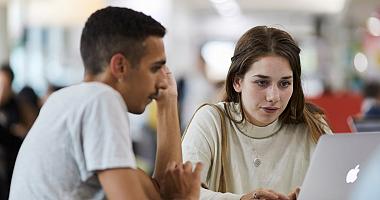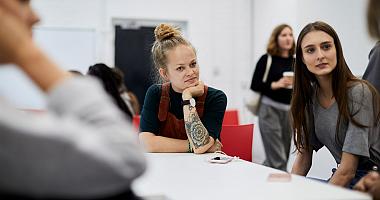Integrated Degree
Anthropology (including Foundation Year)
Content navigation menu
Why study the Integrated Degree in Anthropology
This is a four-year degree. If you successfully achieve the progression requirements of the Foundation Year, you can continue with the full-time three-year BA (Hons) Anthropology degree.
- All you need is an interest in anthropology – there aren’t any formal entry requirements.
- You’ll learn about the key issues and themes and problems that have shaped contemporary anthropological thought.
- You’ll study a diverse range of human societies and cultures to acquire an understanding of the importance of anthropology to contemporary global issues. In this respect, you’ll explore relevant political, economic and social anthropological themes (including social justice; global inequalities; human rights; the environment and sustainability; race and ethnicity; sex, sexuality and gender; capitalism and consumption; peace and violence; nation, place and migration) with a focus on the kinds of inclusive, socially aware, politically engaged, and decolonial practice that epitomises anthropology at Goldsmiths.
- You’ll acquire key academic and study skills for essay writing, reading academic texts, note-taking, giving presentations, and undertaking independent research. You'll also develop digitally based and audio-visual research skills throughout your time on the programme. This will form part of your own, personalised learning journey, which will enable you to produce innovative research projects unique to you, but which will also be supported by your tutors.
- If you successfully achieve the progression requirements for the course, you'll be able to progress onto Year 1 of our BA Anthropology degree and really delve into the specifics of the subject.
- You'll be learning from leading academics in the Department of Anthropology, which has been rated top 10 in the UK for anthropology in the QS World University Rankings by Subject 2023.
Contact the department
If you have specific questions about the degree, contact the Programme Convenor, Dr Justin Woodman.
UCAS code
L601
Length
1 year (Foundation) + 3 years (undergraduate degree) full-time
Fees
Home - full-time: £9250
International - full-time: £20160
Department
Watch videos about your course
The Open Book pathway
You can also study this course through the Open Book pathway. This pathway offers additional support for people from non-traditional backgrounds that may include addiction, offending, and mental health challenges, as well as those who have never truly considered further and higher education.
What you'll study
The Foundation Year is designed to prepare you for undergraduate study in anthropology.
You'll be introduced to the key issues, themes and problems that have shaped anthropological thought. There will be a particular focus on newer, socially aware, politically engaged, decolonial practice which challenges many of the established norms of the subject.
During the year you'll study the following modules:
| Module title | Credits |
|---|---|
| Ways into Anthropology | 30 credits |
| Contemporary Issues in Anthropology | 30 credits |
| Ethnography in Action: Short Research Project | 30 credits |
| Doing Anthropology: Writing, Research, and Methods | 30 credits |
| Modern Cultures in Interdisciplinary Focus | 30 credits |
| Academic Literacies | 30 credits |
Individual tutorial support and academic guidance is given by the programme tutor. You'll also attend a study skills course as part of the programme.
Teaching style
This programme is taught through scheduled learning – for example, through a mixture of lectures, seminars and workshops. You'll also be expected to undertake a significant amount of independent study. This includes carrying out required and additional reading, preparing topics for discussion, and producing essays or project work.
How you'll be assessed
You’ll be assessed by a variety of methods, depending on your module choices. These may include coursework, examinations, group work and projects.
Students who successfully complete the Foundation Year by passing all modules and achieving an overall progression mark of 60% or above will then progress directly to Year 1 of the BA Anthropology degree.
Careers
Our anthropology graduates have been successful in a range of areas, including:
- Filmmaking
- Advocacy work for NGOs and development agencies
- Journalism
- Museum curating
- Media careers
- Teaching
- Postgraduate research
Our particular emphasis on public anthropology encourages our students to explore options in a range of practice-based and public sector career paths.
Find out more about the types of jobs you can get with an anthropology degree.
Skills
The emphasis during the Foundation Year is on developing your academic skills so that you can express your ideas in a clear, concise and articulate manner – whether that's in writing or verbally.
You will also hone your ability to 'think anthropologically', and to engage thoughtfully with academic theory and research.
If you successfully achieve the progression requirements of the Foundation Year and progress to the BA Anthropology degree you will further develop skills in:
- Analytical thinking
- Communication (including public speaking, developing and presenting an argument, note taking, report writing)
- Awareness of social and cultural differences
- Understanding human behaviour
- Thinking 'outside the box'
- Research and evaluation
- Open mindedness
Entry requirements
There are no formal entry requirements for this programme, but you should demonstrate in your personal statement:
- An interest in and aptitude for the subject
- How you will benefit from studying the programme
Your referees are also welcome to include any relevant contextual comments around your academic achievements. We’ll look at all these things when making a decision on your application.
Selection process
Admission is by application to UCAS, interview and a short piece of written work.
International qualifications
We also accept a wide range of international qualifications. Find out more about the qualifications we accept from around the world.
If English isn’t your first language, you will need an IELTS score (or equivalent English language qualification) of 6.0 with a 6.0 in writing and no element lower than 5.5 to study this programme. If you need assistance with your English language, we offer a range of courses that can help prepare you for degree-level study.
Fees and funding
Annual tuition fees
These are the UG fees for students starting their programme in the 2024/2025 academic year.
- Home - full-time: £9250
- International - full-time: £20160
If your fees are not listed here, please check our undergraduate fees guidance or contact the Fees Office, who can also advise you about how to pay your fees.
It’s not currently possible for international students to study part-time if you require a Student Visa, however this is currently being reviewed and will be confirmed in the new year. Please read our visa guidance in the interim for more information. If you think you might be eligible to study part-time while being on another visa type, please contact our Admissions Team for more information.
If you are looking to pay your fees please see our guide to making a payment.
Funding opportunities
We offer a wide range of scholarships and bursaries, and our Careers Service can also offer advice on finding work during your studies. Find out more about funding your studies with us.
Additional costs
In addition to your tuition fees, you'll be responsible for any additional costs associated with your course, such as buying stationery and paying for photocopying. You can find out more about what you need to budget for on our study costs page.
There may also be specific additional costs associated with your programme. This can include things like paying for field trips or specialist materials for your assignments. Please check the programme specification for more information.






